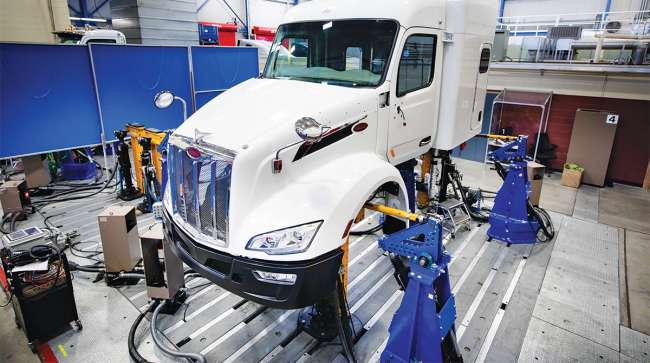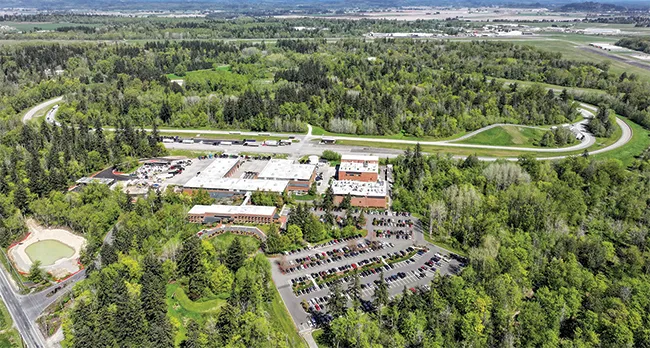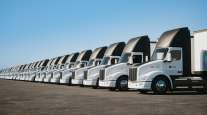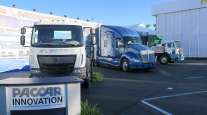Staff Reporter
Paccar Technical Center Expands Campus, Adds Staff

[Stay on top of transportation news: Get TTNews in your inbox.]
The Paccar Technical Center continues to grow in size and head count, some 42 years after the Mount Vernon, Wash., facility began operations, according to its top executive.
Over 600 staff work at the 450-acre site about a 90-minute drive north of Paccar Inc. headquarters in Bellevue, Wash., and more are being added each day, PTC General Manager Phil Stephenson told Transport Topics on July 17. Stephenson expects a further 30 or so staff to come on board in the coming months, he said. Paccar builds Kenworth and Peterbilt trucks.
Soon, the PTC will be adding 38,000 square feet of office, meeting room and cafeteria space with a new office building. That building is expected to be ready in 2025.
Historically, PTC has been a neutral location for product testing and verification within the Paccar group. For example, engineers can replicate the effects of a truck spending months on the road through shake testing or chassis stress at the facility. More recently, it added an innovation hub, with testing of innovations such as three-dimensional printers.
The facility has been developing, testing and validating alternative fuel trucks for Peterbilt, Kenworth and global Paccar brand DAF as well as validating and simulating use of California Air Resources Board-compliant engines, Stephenson said.

Paccar Technical Center campus in Mount Vernon, Wash. (Paccar)
Peterbilt in June said a CARB-compliant version of the MX-13 diesel engine was available for its Model 579, 567 and 589 trucks. Kenworth customers are also able to order a CARB-compliant MX-13 for the T680, T880 and W990 trucks.
There are three laboratories at the PTC facility that test and calibrate engines as well as check and verify specifications. All told, the facility has 213,000 square feet of laboratory space.
The expansion of the alternative fuel powertrains and vehicles is driving the need for additional testing, Stephenson said.
Additional simulations must also be carried out, Stephenson said, including for the cooling systems, capability of battery systems for specific routes and the durability of battery-electric powertrains.
Peterbilt currently has three battery-electric trucks — the 579 EV, a regional haul day cab; the 520 EV refuse truck; and the 220 EV Class 6 or 7 truck.
In May, Einride said it would buy 150 579 EVs, Peterbilt’s biggest EV order so far. Stockholm-headquartered Einride, more commonly known as an autonomous electric vehicle pioneer, plans to use the tractors in its regional haul trucking-as-a-service business.
Peterbilt also teamed up with Toyota to introduce the 579 HFC, a Class 8 hydrogen fuel cell electric vehicle.
Kenworth has an FCEV version of its T680 flagship Class 8 on-highway truck through the Toyota partnership. The manufacturer also offers a battery-electric T680 option as well as Class 6 K270E and Class 7 K370E electric models.
Beginning in 2027, Paccar’s electric trucks will be receiving battery cells manufactured in Mississippi through its Amplify Cell Technologies joint venture with Daimler Truck and Cummins’ zero-emissions unit, Accelera.

Stephenson
Stephenson told TT he and the PTC had been involved in work on battery technology that’s now part of the Amplify effort for around 2½ years, a challenge the executive’s background prepared him for.
While he has been general manager at PTC for 12 years, previously Stephenson was an executive at battery manufacturers Exide Technologies and A123 Systems. Before that, he was chief engineer at vehicle air conditioning and engine cooling systems manufacturer Behr America.
PTC employees tended historically to have backgrounds in mechanical, electrical or materials engineering. Stephenson is a mechanical engineer by training.
With the changes to the modern-day truck, new hires are likely to exhibit interdisciplinary skill sets, he said. “We’re looking for people to look at it from the top down,” he said.
PTC is also hiring software engineers for development and validation, among other things, he said.
“We’re making heavy use of hardware-in-the-loop testing,” he said, or working out how software works in combination with other systems on the truck. Another key area is how trucks interface with non-standardized fueling options.
Want more news? Listen to today's daily briefing above or go here for more info
“One of the big challenges for ourselves and the rest of the industry is infrastructure,” said Stephenson, noting that the PTC is testing how charging and hydrogen fueling infrastructure interacts with trucks.
Part of this involves the SuperTruck 3 program. The Department of Energy initiated SuperTruck 3 in 2021 to focus on the advancement of zero-emission technologies for commercial trucks.
Kenworth showcased its SuperTruck 2 high-efficiency concept tractor at Advanced Clean Transportation Expo 2024 in May. Improvements in freight-hauling were the focus of that program.




